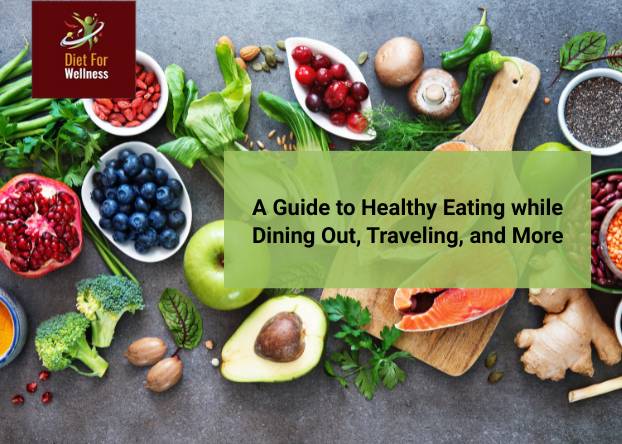A Guide to Healthy Eating while Dining Out, Traveling, and More

Eating out while trying to maintain a healthy lifestyle can feel like a challenging task in the middle of the numerous tempting options. But, with a mindful approach and expert advice, you can enjoy restaurant meals and social gatherings without compromising your health. Hydration, strategic meal planning, and conscious ordering are important steps to achieving this balance.
Smart Strategies for Healthy Dining Out
To help you make healthier choices when eating out, here are some tips from nutrition and fitness experts
1. Pre-Meal Planning
- Balance Your Earlier Meals– If you know you’ll be dining out, especially for dinner, consider having lighter, balanced meals for breakfast and lunch. This strategy helps you “save some calories” for the later meal and avoid overconsumption.
- Avoid Starvation– A common mistake is to starve yourself before a meal out, which often leads to overeating. But this is a big mistake some people make. They keep themselves hungry and then eat anything and everything they get outside. Instead, you should focus on smart snacking.
- Snack Smart Beforehand– To curb intense hunger and maintain control over your choices eat fiber- and protein-rich snacks before heading out. Options like sprouts, salads, fruits, homemade soup, or egg whites can help suppress hunger.
2. Mindful Ordering and Eating
- Prioritize Protein– Making protein-rich choices is one of the healthiest moves you can make. Protein keeps you feeling full longer, preventing overeating. Additionally, the body expends more energy digesting protein, leading to increased calorie burn. She suggests starting with protein-rich appetizers like grilled chicken or paneer tikka to fill up on healthier options and leave less room for carb-heavy main courses.
- Begin with Vegetables– Start your meal with vegetables. Whether it’s tandoori gobhi, sautéed Asian vegetables, or a salad with vinaigrette dressing, vegetables help slow down sugar absorption and promote fullness. Be sure to choose dressings wisely, opting for vinaigrette over creamy or mayonnaise-based options that are often high in unhealthy fats. Starting with salads and chewing slowly helps with proper digestion and suppresses hunger.
- Skip Starchy Starters– Avoid beginning your meal with items like papad or bread baskets. These starchy foods can increase glucose levels and make you feel hungry sooner.
- Focus on the Experience, Not Just the Food– Enjoy the social aspect of dining out, rather than solely focusing on the meal. This can help prevent overeating.
- Eat Slowly and Chew Thoroughly– Expert dieticians and nutritionists stress on the importance of slowing down and chewing your food properly. This allows your brain to register that you’re eating, promoting fullness and preventing overconsumption, especially when engrossed in conversation.
- Apply the 1/3 Rule– Follow this simple plate guideline- aim for 1/3 protein, 1/3 vegetables, and 1/3 carbohydrates.
- Limit Variety– Having too many different options can lead to overeating. Don’t order a wide variety of dishes in one sitting. For example, if you’re having rice, skip noodles for the same meal. This approach helps you avoid feeling overly full or heavy after the meal. Sticking to one type of meal, like grilled protein, can keep you feeling satisfied and less tempted by other offerings.
- Avoid Gravies– Gravy-based dishes are often high in salt and oil, making them less healthy choices.
- Be Skeptical of “Healthy” Labels– Don’t be easily swayed by restaurant claims of using “olive oil” or other “healthy” labels. The overall combination of your meal is what truly matters, and the quality of ingredients at restaurants isn’t always reliable.
- Skip Unhealthy Sauces and Dips– Limit the consumption of dips like mayonnaise, which are often calorie-dense and lack nutritional value.
- Choose Grilled or Tandoori Over Fried– Opt for grilled or tandoori items instead of their fried counterparts. Grilled and tandoori options are prepared with minimal oil and spices, offering a healthier protein source without excess calories from oil.
- Smart Drink Choices– When selecting beverages, avoid sugar-laden mocktails and sodas. You should go for healthier alternatives like nimbu paani (lemon water), coconut water, or fresh seasonal fruit juices. If consuming alcohol, set a limit for yourself.
- Mindful Dessert Consumption– Refined sugar, in large quantities, can contribute to various health issues. If you crave dessert, take just 2-3 bites to satiate the craving rather than eating a whole serving.
- Hydrate Throughout the Day– Restaurant foods often contain high levels of sodium, which can lead to dehydration. Drink plenty of water throughout the day, especially if dining out is pre-planned, and continuing to hydrate for 2-3 days afterward.
3. Post-Meal Care
- Detoxify with Water, Fruits, and Vegetables- Consume plenty of water, vegetables, fruits, and minimal cereals in the days following a meal out to help detoxify the body.
- Include Curd- Curd can aid digestion and reduce bloating. It can be consumed daily, even in winters or at night, before meals.
Special Considerations for Diabetics
People with diabetes should start their meals with a generous portion of salads. They should also carefully control their intake of roti and rice and avoid foods like fruit custard and sweets.
Cultivating Food Knowledge
You need to understand the nutritional value of different foods, knowing what constitutes a carbohydrate, a protein, or a source of fiber. No food is bad, but awareness of your daily intake allows you to make informed choices. For example, if your protein intake has been low, opting for a pizza with chicken or paneer can help balance your nutrients.
Thus, you can ensure a balanced intake of protein, carbohydrates, healthy fats, and fiber, even when enjoying meals outside your home by eating mindfully.
